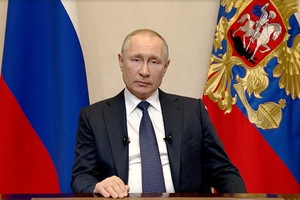The Central Bank will not allow a massive influx of shares converted from receipts
In order to maintain financial stability, the Bank of RUSSIA ordered professional depository participants to carry out separate accounting for shares of Russian issuers received as a result of the conversion of foreign depositary receipts . This is stated in the message of the regulator.
Professional participants should also limit the conduct of operations to write off such securities during the day at the level of 0.2% of their number. These restrictions apply to both exchange and over-the-counter transactions, the Central Bank noted.
The measures do not apply to foreign depository receipts that were purchased before March 1, 2022, and also do not apply to holders of securities who have special permission from the government commission.
The deadline for delisting receipts is getting closer. Who benefits from it and are there any risks Investments , LSE , Delisting , Moscow Exchange , St. Petersburg Exchange
The Central Bank explained the decision taken by identifying a “trend” for residents to buy depository receipts from non-residents from unfriendly countries for subsequent conversion of securities into shares and sale at organized auctions.
“This may lead to a disproportionate increase in the supply of local shares on the market, which will have a significant impact on pricing and provoke a drop in quotations,” the regulator said in a statement.
The Central Bank noted that such a development of events, which the measures taken should prevent, would entail a negative revaluation of assets by Russian investors and pose a threat to the stability of the financial market.
According to experts from BCS Mir Investments, the news is positive for the shares of Russian companies that had large programs of depositary receipts abroad, as it removes a potential overhang of securities in the Russian market. In particular, this affects the shares of Gazprom, Sberbank, Norilsk Nickel, NOVATEK, MTS and Magnit.
The collapse of receipts on the Moscow Exchange. Investors are afraid that it will be difficult to sell them Investments , Moscow Exchange , Russia , Shares
On April 16, Russian President Vladimir Putin signed a law on the delisting of depository receipts of Russian companies from foreign exchanges.
On April 27, a ban on the issue and circulation of foreign depositary receipts for shares of Russian issuers began to operate. Until May 5, Russian issuers are required to take steps to terminate agreements under which securities were placed under foreign law, as well as to terminate programs of depositary receipts.
Holders of depositary receipts established as of the effective date of the law will be able to convert the receipts and receive instead shares of Russian issuers that issued the receipts. Unclaimed receipts may be converted by the depository bank into shares with subsequent sale and transfer of funds to the holder of the receipts.
Shares certified by issued receipts will no longer provide the investor with the right to vote and the right to receive dividends. Investors will be able to receive unpaid dividends after the receipts are converted into Russian shares. This can be done by those who owned receipts on the day the law on delisting came into force.
Russian issuers have the opportunity to keep the programs of depositary receipts by decision of the Government of the Russian Federation. Some Russian companies have indicated their intention to keep their receipts listed outside of Russia. In particular, such plans were reported by MMK, Lenta and Polymetal.
Income from the delisting of Russian securities was estimated at hundreds of millions of dollars Gazprom , Depositary receipt , Delisting , Shares A security tied to the shares of a particular company and issued by a bank (depository bank). The main opportunity that a depositary receipt gives an investor is the opportunity to practically own shares of a foreign company, but at the same time remain within the framework of the legislation of the depository bank. For example, an American Depository Receipt (ADR) for the shares of a Russian company is, on the one hand, an American security, the trade of which is regulated by American law, on the other hand, it gives the right to a share of profits and the right to vote at a meeting of shareholders of a Russian company securities. The issuer can be both an individual and a legal entity (companies, executive authorities or local governments). A financial instrument used to raise capital. The main types of securities: shares (gives the owner the right of ownership), bonds (debt security) and their derivatives. Read more Dividends are a portion of profits or free cash flow (FCF) that a company pays out to shareholders. The payout amount depends on the dividend policy. Their periodicity is also spelled out there - once a year, every half year or quarter. There are companies that do not pay dividends, but direct profits to business development or simply do not have the opportunity due to poor results. Stocks of dividend companies are most often of interest to investors who want to achieve financial independence or secure a decent standard of living in retirement. With the help of dividends, they create a source of passive income for themselves.

